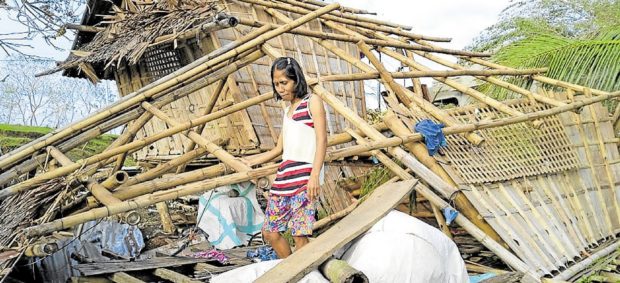
FILE PHOTO: Residents in coastal villages of Anini-y town in Antique province are left homeless after strong winds accompanying Typhoon Odette (international name: Rai) uprooted trees and tore walls and roofs away. PHOTO COURTESY OF CINDY LOQUIAS
MANILA, Philippines — At least 3,599,109 individuals or 927,369 families have been affected by Typhoon Odette’s onslaught over parts of Visayas, Mindanao, Palawan, and Bicol Region, latest numbers from the Department of Social Welfare and Development (DSWD) on Friday showed.
The affected individuals come from 5,652 barangays across the areas ravaged by the cyclone, DSWD said in its Dromic Report on Typhoon Odette. From the 3.599 million affected persons, 303,592 or 76,293 families are still inside 1,242 evacuation centers spread.
In terms of damage to houses, 95,438 were reported to be totally damaged, while 204,332 sustained partial damage.
DSWD clarified that the numbers they have posted are not yet final, as data gathering was severely affected by the typhoon, and communication lines and electricity have not been restored in several areas.
“Some areas affected by Typhoon Odette are experiencing power outage and limited internet access; hence, the challenge in gathering data on affected population and other significant updates. Ongoing assessment and validation are continuously being conducted,” DSWD said in their report.
Still, the department assured that they are currently crafting ways to strengthen the relief operation — proof of which is the combined P90.10 million worth of assistance from the department, local government units (LGUs), and non-government organizations (NGOs).
The humanitarian assistance has been delivered to Odette-hit areas as of Friday, DSWD assured.
“Composed of food and non-food items, the assistance from the DSWD serves as augmentation to the resources of affected LGUs in support of their relief operations to the communities hardest hit by the typhoon,” the department said in a separate statement.
Among the agencies that helped DSWD are the Japan International Cooperation Agency (JICA) which has provided non-food disaster relief items to the victims of Typhoon Odette like the 100 camping tents, 527 sleeping pads, 450 rolls of plastic sheets, and 30 sets of generator with cord reel, and 500 portable jerry cans/water containers.
The above-mentioned items will be distributed in Bohol and Cebu.
DSWD said it is also working with the World Food Program (WFP) in transporting the resources, with 10-wheeler trucks owned by the NGO transporting around 32,000 family food packs (FFPs) that were given to affected residents in Bacolod, Surigao City, Cebu City, and Kabankalan City.
“Likewise, the Department is in constant coordination with LGUs and other partner-agencies such as the Philippine Coast Guard, Philippine National Police, and Philippine Navy for prompt delivery of relief items to disaster areas,” DSWD added.
Other DSWD field offices (FO) who were not affected by the typhoon have also helped, the department said.
“Initially, FO V has allocated 11,000 FFPs for Eastern Visayas, 1,000 of which were already delivered to FO VIII, while the remaining 10,000 food packs are still in transit,” DSWD explained.
“On the other hand, the FO IX delivered some 7,000 FFPs and other non-food items such as 135 blankets, 2,431 bath towels, 309 bed sheets and 2,325 mosquito nets to Caraga Region on December 19. Likewise, FO XI sent some 8,000 food packs, 3,000 family kits, 2,500 sleeping kits, 1,500 hygiene kits, and 2,000 malongs to the Region on December 20,” it added.
Typhoon Odette barreled through nothern parts of Mindanao, southern portions of Visayas, and Palawan, leaving behind a trail of destruction that is being compared to Super Typhoon Yolanda’s effects.
As of Friday, the National Disaster Risk Reduction Management Council said that 326 have been reported dead, 58 missing, and 661 injured.